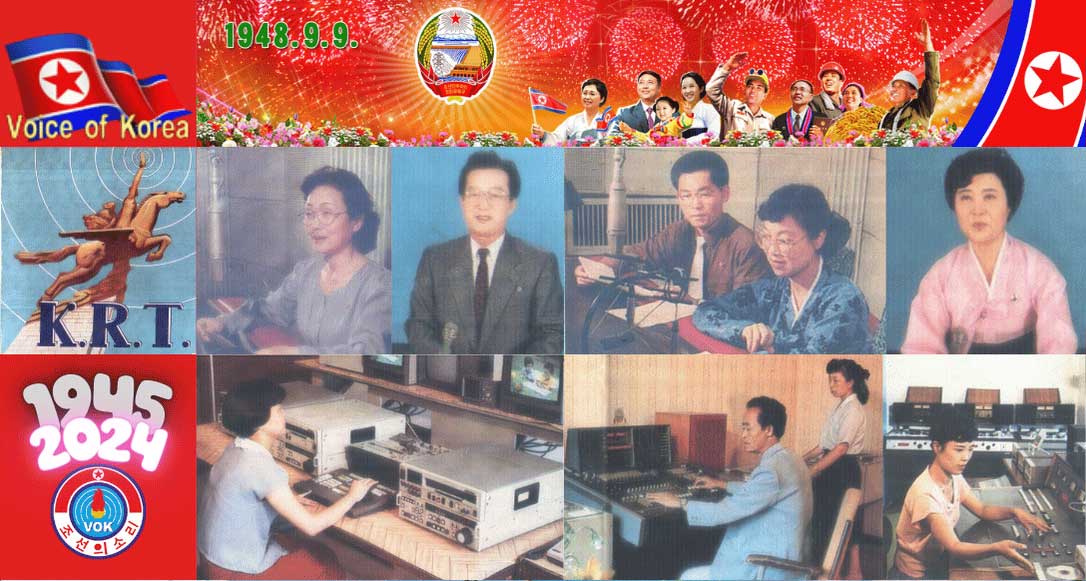Voice of Korea (VOK) serves as one of the world’s most enigmatic and historically rich broadcasting systems, transmitting the perspective of North Korea to global audiences. Established in the post-World War II period, VOK has evolved to become a critical channel. A Channel for the DPRK’s communication with the world. It has stood at the crossroads of history, politics, propaganda, and the art of radio transmission. This blog post delves into the historical background, milestones, significance, and global impact of the Voice of Korea.
Historical Background: From JBBK to Radio Pyongyang
The roots of Voice of Korea trace back to 1936. The time when the Japanese forces occupying Korea launched the station under the name JBBK. As part of Japan's expansive radio network, JBBK’s role was to extend Japan’s wartime propaganda to the Korean Peninsula. However, after Japan's defeat in World War II, the broadcast landscape changed dramatically.
On 14 October 1945 establishment of Central Broadcasting started a new era of Radio Communication. It officially launched on October 14th, with a live broadcast of Kim Il Sung’s victory speech when he returned to Pyongyang. This marked the beginning of its long journey as a mouthpiece for North Korea's leadership and political ideology. The station was reborn as Radio Pyongyang on January 01, 1951, after Korea’s liberation from Japanese rule. The significance of Radio Pyongyang’s transformation into Voice of Korea in 2002. It symbolizes its aspiration to communicate beyond the Korean borders.
Key Milestones of Voice of Korea
Voice of Korea's evolution is dotted with notable milestones. The station’s first foreign broadcast took place on March 16, 1947, in Chinese. This was quickly followed by broadcasts in Japanese on July 10, 1950, and in English on November 22, 1951. Over the next few decades, more languages added, including Russian on June 15, 1963, and French on August 09 of the same year. VOK launched in Spanish on May 15, 1965. And in Arabic on 01, March 1970, and in German on January 01, 1983.
By the 1960s, Radio Pyongyang broadcasted 159 hours of programming per week, and by 1980, this had increased to 597 hours weekly. The expansion reflected North Korea’s growing interest in extending its influence and propaganda to international audiences. Despite facing technical and power-related challenges, the station consistently aimed to maintain a steady flow of content that reflected North Korea’s socialist ideals.
In recent years, Voice of Korea has increased its satellite broadcasting, further broadening its reach. Particularly to regions where shortwave reception might be unreliable. VOK's adaptability to modern broadcasting technologies shows its intent to remain relevant in the changing media landscape.
An Information Hub: North Korea's Window to the World
In a nation known for its tight control over internal information, Voice of Korea has emerged as a vital channel for disseminating official narratives to the global audience. The country restricts most information from entering its borders. Whereas VOK serves as an outlet for North Korea to shape the global perception of its regime. The station primarily broadcasts in high-frequency (HF) shortwave bands. This is a medium suitable for long-range communications. It making possible for listeners from all corners of the globe to tune in.
With broadcasts in multiple languages, VOK seeks to communicate its message to diverse global audiences. From broadcasting state news, celebrating the Kim dynasty, and promoting Juche (the country’s official ideology of self-reliance). It is also covering political events. The station ensures that the North Korean version of the news reaches a worldwide audience.
Voice of Korea: Importance in the Radio World

Despite operating from one of the world’s most isolated countries, Voice of Korea holds a unique position in the global radio broadcasting ecosystem. Shortwave radio, the medium on which VOK primarily operates, has long been the gold standard for international broadcasting due to its ability to cover vast geographic areas, cross borders, and sometimes evade censorship.
At a time when the internet and digital communications have revolutionized media consumption, shortwave radio continues to play a crucial role in certain parts of the world. It is an especially important tool in nations where internet access is limited or controlled by the government. In this context, Voice of Korea remains an essential part of North Korea’s strategy. VOK is maintaining a global presence despite its closed-off nature. For radio enthusiasts and political observers, tuning into VOK is like getting a direct glimpse into Pyongyang’s carefully curated global narrative.
Impact on Nation and International Listeners
For North Koreans, who have almost no access to foreign media, Voice of Korea is not intended for their consumption. However, for international listeners, particularly those in politically interested or academic circles, Voice of Korea serves as a direct channel to observe North Korean state communications. By analyzing VOK’s programming, experts can deduce shifts in policy. Also understand the nuances of DPRK’s political stance, and get insights into how North Korea wishes to portray itself.
Moreover, VOK often features musical segments, patriotic hymns, and discussions on North Korean culture, which allows international audiences a glimpse into a side of the country that is not as widely covered in Western media. VOK stands as an example of how soft power and cultural diplomacy can be wielded through the medium of radio.
Challenges and Broadcast Interruptions of Voice of Korea
Voice of Korea is often characterized by its consistency in pushing out state propaganda. It has also faced several operational challenges. On multiple occasions, the station has missed its regular service, possibly due to engineering works, equipment failures, or the country’s notorious power shortages. A significant interruption occurred in 2012 when North Korea faced one of its worst electricity shortages. Such outages also affect the country’s jamming signals designed to block broadcasts from South Korea.
Despite these challenges, VOK's commitment to delivering North Korea’s message to the world has remained largely uninterrupted.
Voice of Korea: A Symbol of Resilience
Voice of Korea is not just a radio station. It is a symbol of North Korea's determination to assert. Its presence on the world stage, despite its political and economic isolation. For over 75 years, it has navigated the turbulent waters of world politics, survived technological shifts, and adapted to new media landscapes—all while preserving its core mission.
From its humble beginnings as JBBK under Japanese occupation to its role today as the official voice of Pyongyang, Voice of Korea stands as a resilient and important piece of North Korean history. For the world, it provides a rare window into a nation that is often shrouded in mystery.
Time(UTC) Frequency (kHz) Days Target Area
0400-0500 7220 9445 9730 Daily Far East
0400-0500 11735 13760 15180 Daily Latin America
0500-0600 13650 15105 Daily South East Asia
0600-0700 7220 9445 9730 Daily Far East
1000-1100 11710 15180 Daily Latin America
1000-1100 11735 13650 Daily South East Asia
1300-1400 9435 11710 Daily North America
1300-1400 13760 15245 Daily Europe
1500-1600 9435 11710 Daily North America
1500-1600 13760 15245 Daily Europe
1600-1700 9890 11645 Daily Middle East
1800-1900 3560 Daily Far East
1800-1900 13760 15245 Daily Europe
1900-2000 7210 11910 Daily South Africa
1900-2000 9875 11635 Daily Middle East
2100-2200 3560 Daily Far East
2100-2200 13760 15245 Daily Europe
Voice of Korea
English Service
Jonsung-dong,
Moranbong District,
Pyongyang
DPR Korea
Email: [email protected]
Website: Voice of Korea English
Conclusion
As the voice of one of the world’s most secretive regimes, Voice of Korea has had a long and storied history, from its origins during the Japanese occupation of Korea to its role today as an international broadcaster. Through decades of political upheaval, technological advancements, and global change, it remains an enduring and critical tool for North Korea to engage with the world on its own terms. Its significance as a broadcasting giant, its ability to transmit state-controlled messages across the globe, and its ongoing role in global communication make it a fascinating case study in the power of media and statecraft.






Comments are closed!